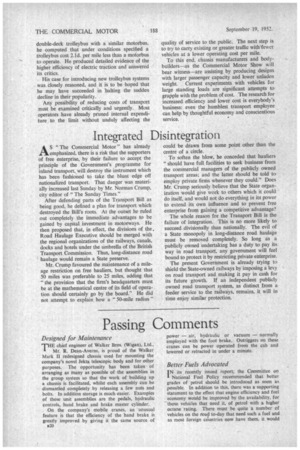Integrated Disintegration
Page 54

If you've noticed an error in this article please click here to report it so we can fix it.
A'" The Commercial Motor" has already emphasized, there is a risk that the supporters of free enterprise, by their failure to accept the principle of the Government's programme for inland transport, will destroy the instrument which has been fashioned to take the blunt edge off nationalized transport. That danger was materially increased last Sunday by Mr. Norman Crump, city editor of "The Sunday Times."
After defending parts of the Transport Bill as being good, he defined a plan for transport which destroyed the Bill's roots. At the outset he ruled out completely the immediate advantages to be gained by capital investment in motorways. He then proposed that, in effect, the divisions of the. Road Haulage Executive should be merged with the regional organizations of the railways, canals, docks and hotels under the umbrella of the British Transport Commission. Thus, long-distance road haulage would remain a State preserve.
Mr. Crump favoured the maintenance of a mileage restriction on free hauliers, but thought that 50 miles was preferable to 25 miles, adding that "the provision that the firm's headquarters must be at the mathematical centre of its field of operation should certainly go by the board." He did not attempt to explain how a "50-mile radius" could be drawn from some point other than the centre of a circle.
To soften the blow, he conceded that hauliers "should have full facilities to seek business front the commercial managers of the publicly owned transport areas; and the latter should be told to employ private firms whenever they could." Does Mr. Crump seriously believe that the State organization would give work to others which it could do itself, and would not do everything in its power to extend its own influence and to prevent free enterprise from gaining a competitive advantage?
The whole reason for the Transport Bill is the failure of integration. This is no more likely to succeed divisionally than nationally. The evil of a State monopoly in long-distance road haulage must be removed completely. So long as a publicly owned undertaking has a duty to pay its way in road transport, any government will feel bound to protect it by restricting private enterprise.
The present Government is already trying to shield the State-owned railways by imposing a levy on road transport and making it pay in cash for its future growth. if an independent publicly owned road transport system, as distinct from a feeder service to the railways, remains, it will in time enjoy similar protection.




































































































































































